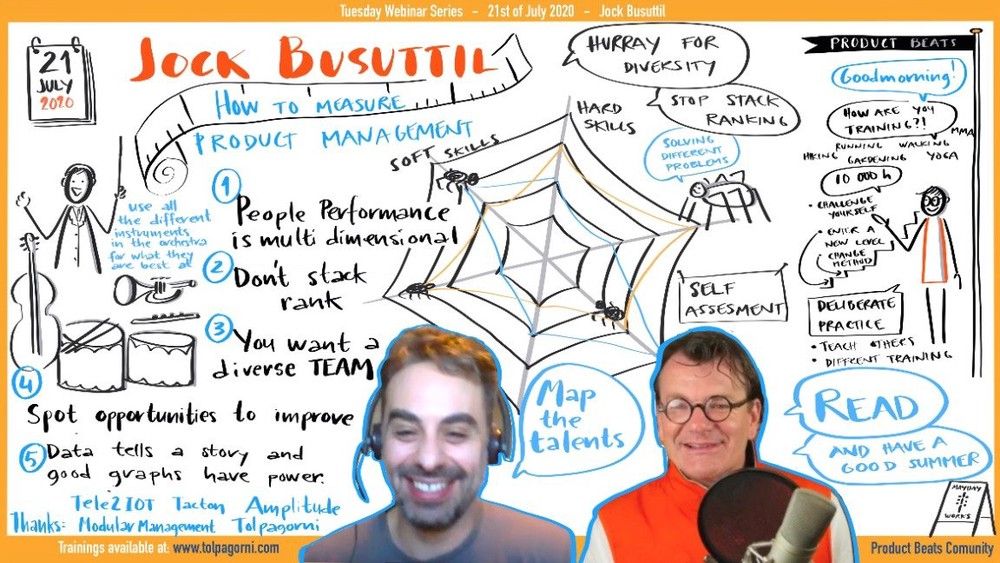Episode 18: Measuring Product Management w/Jock Busuttil
21 July, 2020 / Host: Magnus Billgren
Measuring Product Management Performance
As Product Managers, we are constantly seeking growth and development in our role. The road to becoming an expert in our field requires a big personal responsibility for our growth, and it's not just about talent. It's about hard work, dedication, and taking the time to learn and evolve. Anders Ericsson, in his book "PEAK," discusses the importance of deliberate practice and investing 10,000 hours to become an expert in your field. Similarly, Angela Duckworth's book "GRIT" emphasizes the importance of perseverance and passion in achieving long-term goals.
However, in order to grow and evolve, we also need to know where we need to improve. Jock Busuttil, the founder of Product People in the UK, shared his thoughts on how to assess and support product managers to grow in their role.
The Challenge of Measuring Product Management
Measuring product management is a challenge because it involves a variety of skills and responsibilities that cannot be easily quantified. Traditional methods of performance evaluation, such as the stack rank system, don't work well for product managers because they are not in a sales or operational role that can be easily measured by revenue or other metrics. The stack rank system also creates an unhealthy competition among team members and can lead to a toxic work environment.
Jock Busuttil realized that he needed to come up with a new way to measure product management performance that would not only be fair but also help identify skills gaps and create development plans for each product manager. He came up with the talent map system.
The Talent Map System
The talent map system involves discussing the dimensions of measuring product management performance with the team, identifying the most important skills, and using these skills as metrics.
According to Jock, assessing and supporting personal growth in Product Management requires a focus on three key areas:
- Product Management Knowledge: This area includes models, tools, and processes that Product Managers need to know to perform their role effectively. It's essential to stay up-to-date with the latest trends and methodologies in Product Management to stay ahead of the competition.
- Personal Skills: Interacting with stakeholders, communication, and the ability to tell a story are crucial skills for Product Managers to develop. These personal skills are often overlooked, but they play a significant role in shaping how Product Managers are perceived by their peers, stakeholders, and customers.
- Understanding of Adjacent Functions: To be a successful Product Manager, you need to have a good understanding of the functions that work alongside Product Management, such as development, sales, and budgeting. Having knowledge of these functions allows Product Managers to make better-informed decisions and collaborate more effectively with their peers.
Jock's assessment model is not intended for ranking individuals, but rather for developing them. The assessment is often done in three areas: individuals, the product management function, and product performance. The talent map is used to identify gaps in skills and create development plans. It's also a way of showing senior management that it's not possible to rank Product Managers in a single dimension of measurement.
Takeaways
- Traditional "stack rank" methods of measuring product management performance may not be effective, as they don't take into account the multifaceted nature of the role.
- The "talent map" system is a more nuanced approach to measuring product management performance, as it takes into account a range of skills and disciplines, including emotional/soft skills, technical skills, and understanding of adjacent functions.
- To continue to grow in the role of product management, individuals must take personal responsibility for their own development and continually work on improving their skills, with a focus on deliberate practice and a growth mindset.
As Jock Busuttil mentioned, taking personal responsibility for our growth as Product Managers is crucial for success. One way to continue learning and developing our skills is through certification programs. If you're interested in taking your Product Management career to the next level, consider exploring The Productbeats Product Management Certification Program. With a focus on practical skills and real-world application, this program can help you become a more effective Product Manager and demonstrate your expertise to potential employers.
You might also enjoy watching...
Copyright © 2026 ProductBeats AB

Get The Program Brochure
Submit the form below to have The Program Brochure delivered to your inbox
The title of the notification
The descriptive text of the notification


